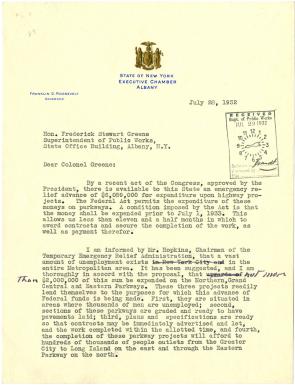The origins of FDR’s New Deal, 1932
A Spotlight on a Primary Source by Franklin D. Roosevelt
 When the nation fell into the Great Depression following the stock market crash of 1929, Franklin Delano Roosevelt was serving as New York’s governor and was responsible for shaping the state’s response to the crisis. The origins of the Roosevelt’s New Deal can be seen in this letter of July 28, 1932, addressed to New York’s superintendent of public works, Frederick S. Greene. Roosevelt describes his plan to appropriate federal emergency relief to highway projects that would both benefit the state’s infrastructure and combat unemployment. Since the funds were given with an expiration date, Roosevelt instructed Greene to work swiftly and "impose conditions therein which will insure the employment of the greatest number of men."
When the nation fell into the Great Depression following the stock market crash of 1929, Franklin Delano Roosevelt was serving as New York’s governor and was responsible for shaping the state’s response to the crisis. The origins of the Roosevelt’s New Deal can be seen in this letter of July 28, 1932, addressed to New York’s superintendent of public works, Frederick S. Greene. Roosevelt describes his plan to appropriate federal emergency relief to highway projects that would both benefit the state’s infrastructure and combat unemployment. Since the funds were given with an expiration date, Roosevelt instructed Greene to work swiftly and "impose conditions therein which will insure the employment of the greatest number of men."
He allotted $2,000,000 to the Northern, Grand Central, and Eastern Parkways projects for paving and other improvements. The work ultimately led to the development of Long Island and other outlying areas of New York City while securing employment for many who were out of work. Roosevelt’s view of government intervention as an agent for change was taken to the national stage less than one year later when he implemented his New Deal policies as the nation’s 32nd president.
View images of the entire document here.
Excerpts
By a recent act of the Congress, approved by the President, there is available to this State an emergency relief advance of $6,059,000 for expenditure upon highway projects. . . . It has been suggested, and I am thoroughly in accord with the proposal, that upwards of not more than $2,000,000 of this sum be expended on the Northern, Grand Central and Easter Parkways. These three projects readily lend themselves to the purposes for which this advance of Federal funds is being made. First, they are situated in areas where thousands of men are unemployed; second, sections of these parkways are graded and ready to have pavements laid; third, plans and specifications are ready so that contracts may be immediately advertised and let, and the work completed within the allotted time, and fourth, the completion of these parkway projects will afford to hundreds of thousands of people outlets from the Greater City to Long Island on the east and through the Eastern Parkway on the north.
May I not urge that you facilitate with all possible speed the advertising and awarding of these contracts, and that you impose conditions therein which will insure the employment of the greatest number of men on these projects?
